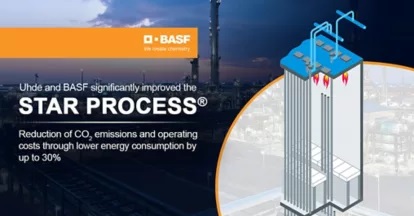Petrochemical
BASF and thyssenkrupp optimize STAR process dehydrogenation technology
The technology has been optimized to reduce CO2 emissions and operating costs through lower energy consumption by up to 30%, while also reducing investment costs and enabling additional feedstock savings
-
By ICN Bureau | April 27, 2022
BASF and thyssenkrupp Uhde achieved measurable improvements in the STAR process, a proprietary dehydrogenation process from thyssenkrupp Uhde that can produce propylene from propane feedstocks, or iso-butylene from iso-butane feedstocks. The technology has been optimized to reduce CO2 emissions and operating costs through lower energy consumption by up to 30%, while also reducing investment costs and enabling additional feedstock savings. Started in 2020, thyssenkrupp Uhde focussed in this joint development on the optimisation and further development of the STAR process, while BASF validated the targeted improvements through an extended test program.
“The cooperation between BASF and thyssenkrupp Uhde over the past 18 months since announcing the joint development agreement has been exceptional and seamless”, says Guido Daniel, Executive Director Petrochemicals and Polymers at thyssenkrupp Uhde. “In a joint team effort, both partners have provided their specific expertise to improve the dehydrogenation process. The results show that we significantly exceeded our goals to reduce the consumption of energy and resources of the STAR process.”
Detlef Ruff, Senior Vice President, Process Catalysts at BASF, says: “We are proud to be part of this collaboration and to bring in our unique know-how as a world-leading catalyst manufacturer. This joint project is a perfect example of how we enable sustainability for our customers and partners.”
